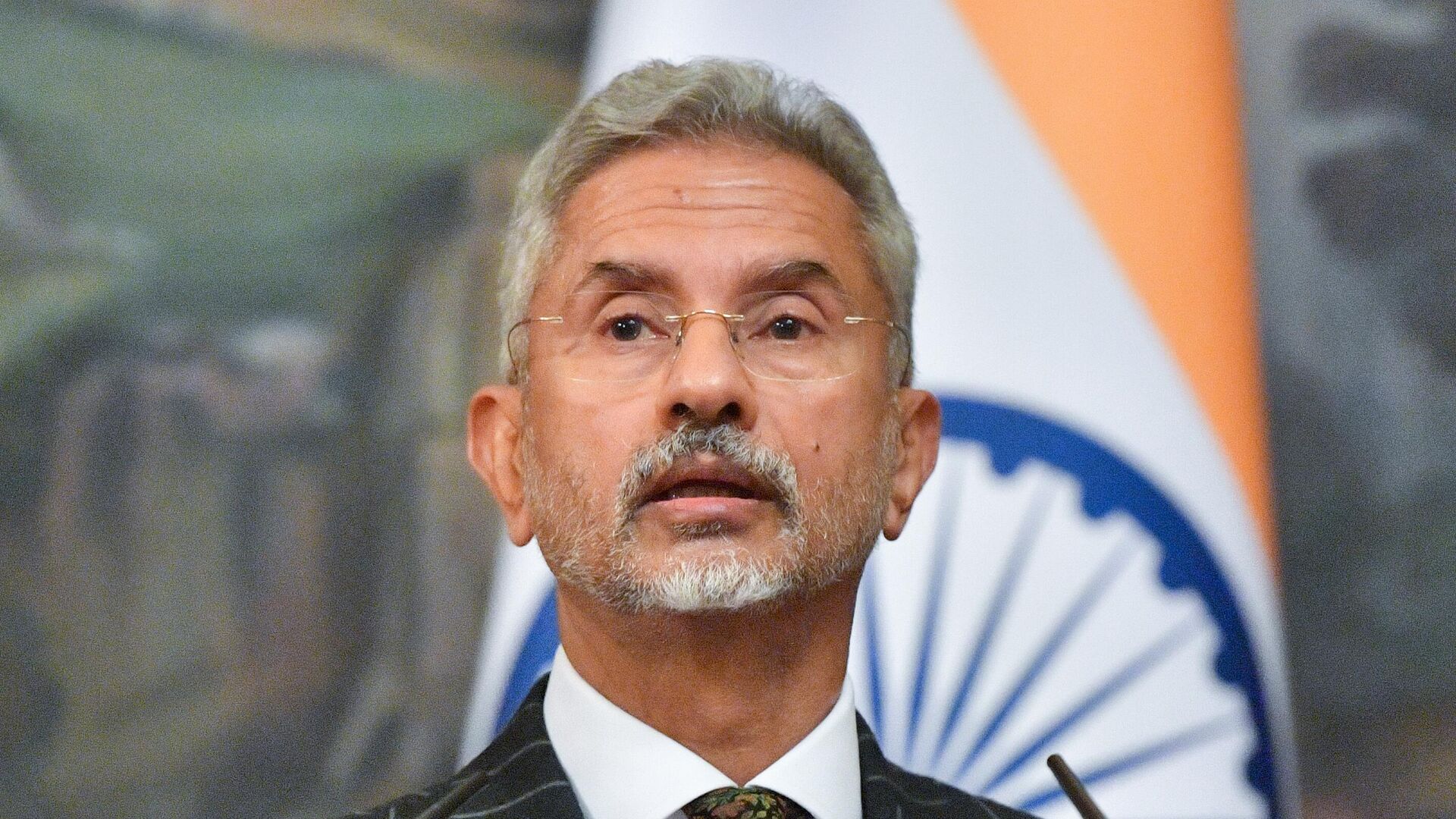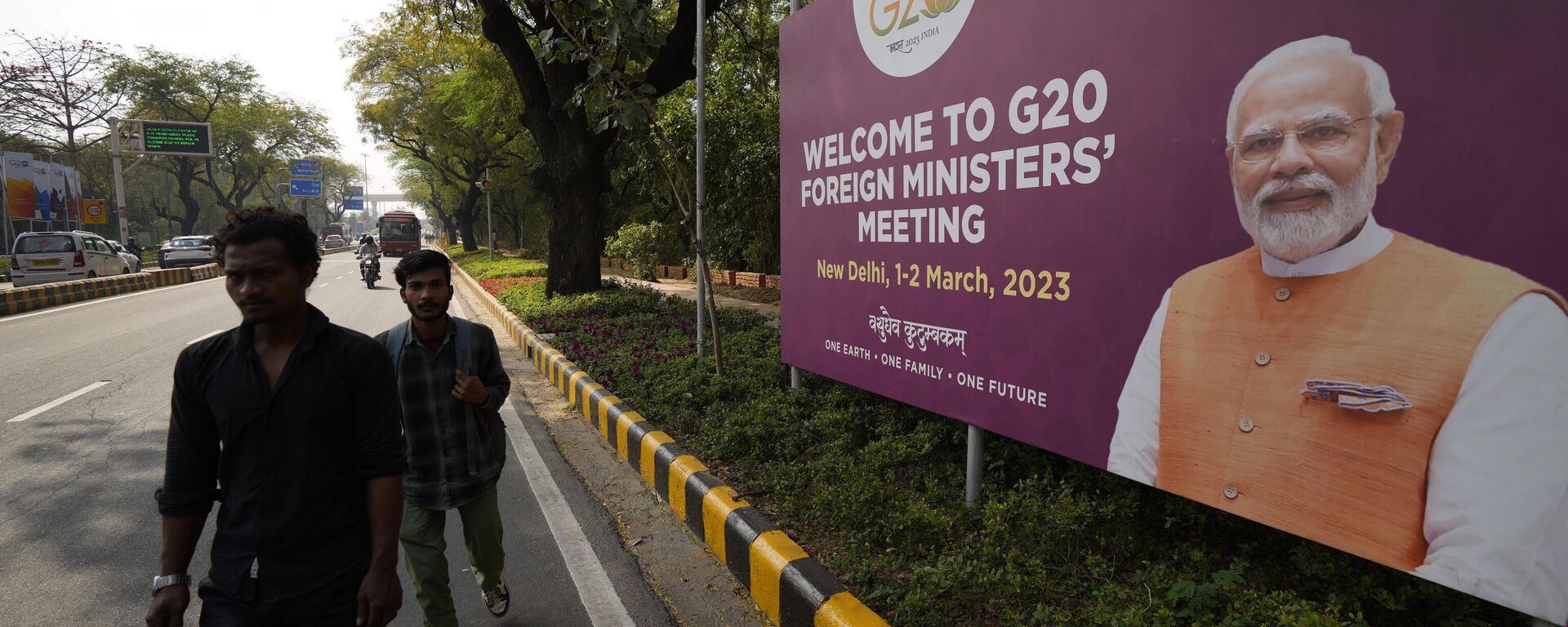https://sputniknews.in/20230302/global-decision-making-doesnt-reflect-todays-politics-indian-foreign-minister-says-1046383.html
Global Decision-Making Doesn't Reflect Today's Politics, Indian Foreign Minister Says
Global Decision-Making Doesn't Reflect Today's Politics, Indian Foreign Minister Says
Sputnik India
The Rashtrapati Bhavan, the presidential palace in New Delhi, is the venue of the G20 Foreign Ministers meeting, held under India's presidency for the first time.
2023-03-02T15:55+0530
2023-03-02T15:55+0530
2023-03-02T15:55+0530
india g-20 presidency
india
g-20
new delhi
s. jaishankar
narendra modi
https://cdn1.img.sputniknews.in/img/07e7/03/02/1047426_0:158:2841:1756_1920x0_80_0_0_9028732c544b63435e31660e357c9e0d.jpg
Indian Foreign Minister Subrahmanyam Jaishankar on Thursday said that the decision-making at multilateral organizations like the United Nations doesn't reflect the realities of present-day politics, economics, or aspirations of the people.Highlighting the flaws of the current global order, Jaishankar said that while discussions on reforming the UN have been going on for decades, nothing has come out of them. The Indian minister mentioned that the global decision-making process would lose its relevance if it wasn't democratized."Since 2005, we have heard sentiments for reform being expressed at the highest level. But as we all know, these have not materialized. The reasons are no secret either. The longer we put it off, the more the credibility of multilateralism stands eroded. Global decision-making must be democratized if it has to have a future," he added.Like Prime Minister Modi, Jaishankar stated that the G20 delegates should put their differences aside on matters concerning the world, as he agreed that multilateralism was facing a challenge.Additionally, he acknowledged that "multilateral" institutions needed to get in sync with the changing realities of the geopolitical world and act accordingly."As we look ahead, there are both pressing and more systemic challenges that we all confront. The future of multilateralism depends very much on our ability to strengthen it in a changing world," Jaishankar noted.Earlier in the day, Prime Minister Modi pointed out that "multilateralism" was in crisis while "global order has failed" in fulfilling the aspirations of developing countries."After years of progress, we are at a risk today of moving back on the sustainable development goals," he elaborated.Modi concluded his address to G20 ministers with an emotional appeal to world leaders, urging them to overcome their differences through dialogue.
https://sputniknews.in/20230302/pm-modi-at-g20-multilateralism-in-crisis-global-governance-has-failed-1044053.html
india
new delhi
Sputnik India
feedback.hindi@sputniknews.com
+74956456601
MIA „Rossiya Segodnya“
2023
Pawan Atri
https://cdn1.img.sputniknews.in/img/07e6/0c/13/139630_147:0:831:684_100x100_80_0_0_8fa2b25903e7787fe6a2698552c167df.png
Pawan Atri
https://cdn1.img.sputniknews.in/img/07e6/0c/13/139630_147:0:831:684_100x100_80_0_0_8fa2b25903e7787fe6a2698552c167df.png
News
en_IN
Sputnik India
feedback.hindi@sputniknews.com
+74956456601
MIA „Rossiya Segodnya“
Sputnik India
feedback.hindi@sputniknews.com
+74956456601
MIA „Rossiya Segodnya“
Pawan Atri
https://cdn1.img.sputniknews.in/img/07e6/0c/13/139630_147:0:831:684_100x100_80_0_0_8fa2b25903e7787fe6a2698552c167df.png
subrahmanyam jaishankar global decision-making, jaishankar global decision-making, s jaishankar global decision-making, global decision-making jaishankar, subrahmanyam jaishankar un reforms, subrahmanyam jaishankar g20 foreign ministers meeting, jaishankar g20 foreign ministers meeting, s jaishankar g20 foreign ministers meeting, s jaishankar g20 foreign ministers meeting,
subrahmanyam jaishankar global decision-making, jaishankar global decision-making, s jaishankar global decision-making, global decision-making jaishankar, subrahmanyam jaishankar un reforms, subrahmanyam jaishankar g20 foreign ministers meeting, jaishankar g20 foreign ministers meeting, s jaishankar g20 foreign ministers meeting, s jaishankar g20 foreign ministers meeting,
Global Decision-Making Doesn't Reflect Today's Politics, Indian Foreign Minister Says
The Indian foreign minister's remarks about the global-decision-making process came after Prime Minister Narendra Modi said that "multilateralism" was in crisis.
Indian Foreign Minister Subrahmanyam Jaishankar on Thursday said that the decision-making at multilateral organizations like the United Nations doesn't reflect the realities of present-day politics, economics, or aspirations of the people.
In his opening remarks at the G20 Foreign Ministers' meeting being held at the presidential palace in New Delhi, Jaishankar said: "Current global architecture is in its 8th decade. The number of members of the UN has quadrupled in this period. It neither reflects today's politics, economics, demographics or aspirations."
Highlighting the flaws of the current global order, Jaishankar said that while discussions on reforming the UN have been going on for decades, nothing has come out of them.
The Indian minister mentioned that the global decision-making process would lose its relevance if it wasn't democratized.
"Since 2005, we have heard sentiments for reform being expressed at the highest level. But as we all know, these have not materialized. The reasons are no secret either. The longer we put it off, the more the credibility of multilateralism stands eroded. Global decision-making must be democratized if it has to have a future," he added.
Like Prime Minister Modi, Jaishankar stated that the G20 delegates should put their differences aside on matters concerning the world, as he agreed that multilateralism was facing a challenge.
Additionally, he acknowledged that "multilateral" institutions needed to get in sync with the changing realities of the geopolitical world and act accordingly.
"As we look ahead, there are both pressing and more systemic challenges that we all confront. The future of multilateralism depends very much on our ability to strengthen it in a changing world," Jaishankar noted.
Earlier in the day, Prime Minister Modi pointed out that "multilateralism" was in crisis while "global order has failed" in fulfilling the aspirations of
developing countries.
"We must all acknowledge that multilateralism is in crisis today...The experience of the last few years - financial crisis, climate change, pandemic, terrorism and wars - clearly shows that global governance has failed," Modi said.
"After years of progress, we are at a risk today of moving back on the sustainable development goals," he elaborated.
Modi
concluded his address to G20 ministers with an emotional appeal to world leaders, urging them to overcome their differences through dialogue.
"We are meeting at a time of deep global divisions. We have a responsibility to those, not in this room. We should not allow issues that we cannot resolve together to come in the way of those we can," he stated.



